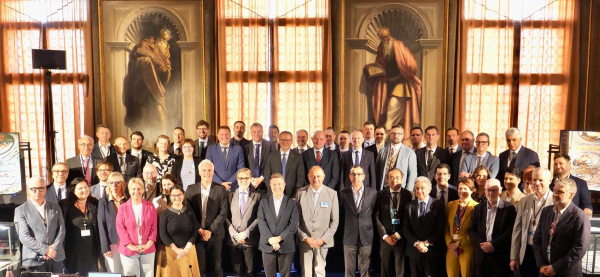
Local and regional representatives from across Europe, as well as representatives from the agricultural sector, participated in a high-level NAT Commission Meeting in Venice, Italy, hosted by ECR Member and NAT First Vice-President Mr Roberto Ciambetti who also serves as the President of the Veneto Regional Council.
The meeting took place in the Sala Sansoviniana of the Biblioteca Marciana and was opened with a study visit to the MOSE - a project intended to protect the city and the Venetian Lagoon from flooding. Comprising a system of mobile barriers at the lagoon’s inlets, MOSE exemplifies territorial resilience by combining innovation, environmental safeguarding, and infrastructure adaptability. With extreme weather events increasing in intensity, MOSE stands as a critical defence mechanism, preserving Venice’s cultural heritage and urban landscape for future generations. Participants were given a tour of the artificial island, control room, and underground tunnels.
"Today's study visit puts into action the core mission of our NAT Commission – which is resilience. MOSE is more than just an engineering device, it represents how local and regional authorities are at the forefront of safeguarding the cultural heritage of their territories through innovation and foresight", stated Roberto Ciambetti.
Following further opening remarks from the host Roberto Ciambetti, members and participants were convened for debates on the future of agriculture including a key topic on the challenges in the wine sector. ECR members stressed the importance of relieving farmers from bureaucratic regulatory burdens and underlined the contribution of farmers in bringing safe and healthy food to our tables. Members also called for policies to empower farmers, not burden them. If agriculture is to remain competitive, innovative, and attractive to new generations, we must move from rhetoric to reality.
Mr Ciambetti, recently appointed rapporteur on the European Commission's proposal of measures to ensure Europe's wine sector remains competitive, resilient, and a vital economic force in the decades to come is leading the work on this file on behalf of the European Committee of the Regions (CoR). This regional approach is especially urgent for key sectors such as wine production, which employs over 3 million people and contributes more than €100 billion in market value. The wine sector remains a cornerstone of the EU economy, particularly in rural areas, and a pillar of the EU’s cultural heritage but faces major challenges such as shifting consumer trends, international geopolitical tensions and increasingly extreme weather conditions. Regional and local leaders held a debate led by Roberto Ciambetti on market rules and support measures in the wine sector, calling for actions to better protect wine producers against external threats. The work will finish with the adoption of an opinion in the CoR's July plenary session.

